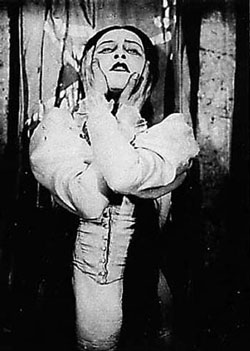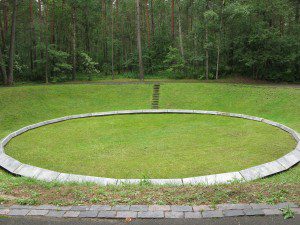Last year, I was lucky enough to score a table at LA Zine Fest, where I sold my witchy zines and did Tarot readings. I’m still sort of in the broom closet to my family and coworkers, but I publish my zines under my given name, so it’s pretty easy for people to find out. Still, it didn’t occur to me that they might come to the event.
But they came! One of the bigwigs from my library came–my boss’s boss’s boss. One of the TAs I work with came and asked for a reading about her dissertation. And, most amazingly, two of my cousins showed up. Technically, they’re my father’s cousins, which means they have access to family lore that doesn’t always filter down to the younger generations. They each bought copies of my zines and my novel. I read their cards. Afterwards, I bit my nails. Reading cards is one thing; Tarot is trendy right now and lots of people are doing it for fun. It’s quite another to “actually believe in that stuff.” What would my cousins think when they found out I was a Witch?
Turns out, they thought it was the most natural thing in the world. They both emailed me to tell me they liked my zines. And one of my cousins told me something very interesting–something she’d never thought to mention before.
Apparently my great-great grandmother Esther, a Hasidic wife and mother in Ostrolenka, Poland, was a folk healer. People would knock on her door in the middle of the night to have her cure little ailments. She filled in the gaps between what the rabbis and doctors could provide.
I try, sometimes, to think of her with an easy fondness; sometimes I even try to indulge in a little nostalgia. But something always interrupts me. See, when I think of my great-great-grandmother, I instantly think of her daughter Peshe and son Moshe–my great-grandmother Sarah’s sister and brother. Peshe and Moshe, along with their spouses and children, tried to escape the Holocaust but disappeared somewhere in Belarus. We can only assume that they were caught and murdered.
Ancestor work can be intense and painful, even if your Beloved Dead passed under the best of circumstances. But when genocide is involved, it can be overwhelming.
* * *
Sometimes I see the narrative of 20th century Jewry condensed and simplified to this: Hitler tried to wipe us out in the Holocaust, but we survived and now we’re thriving in Israel! Take that, Hitler! Am Yisrael Chai!

But that history just isn’t true. (And don’t get me started on what it means to Palestinians.) Yes, Jewish civilization continued, but the Yiddish culture that flourished in Europe was obliterated. It’s gone. It’s over. We went from roughly 12 million speakers in the 1930’s to fewer than 2 million in the 90’s, and most of those speakers are either elders or members of insular Orthodox communities. Our art, our literature, our film–it’s gone, gone, all gone, relegated to archives and museums. It’s true that Zionism and assimilation also played roles, but the Holocaust was a decisive factor. Did you know Yiddish is over a thousand years old? Did you know it used to be one of many Jewish languages? You’d never know it today.
I never knew the extent of the damage until I spent 6 weeks in the Baltic states: 5 weeks in Lithuania, taking an intermediate Yiddish class, and 1 week visiting Riga and Tallinn. One of my classmates told me his wife couldn’t take all the Holocaust museums and changed her plane ticket to go home early. I privately wrote her off as a wimp. But there are only so many mass grave sites you can visit before they start to eat away at you. There are only so many times you can stand in the exact place where all the children in a village were shot. There are only so many prayers you can say for the dead before, like the dybbuk of Jewish legend, they begin to graft themselves onto you. When I got to Riga’s Museum of the Occupation, I had to leave halfway through because I finally buckled. The history is so big, so ferocious, so stunningly bottomless. I think we spiritually-minded people sometimes fall victim to the idea that everything happens for a reason, but I can tell you this with absolute certainty: the Holocaust was as pointless as it was evil.
I know the term “Burning Times” is loaded and problematic and based more on an imagined history than a literal one, but it comes to me when I think about my Witchcraft and my Jewishness. Both are trailed by a long line of ancestors asking, Why? Why? Why me? Why my children? I don’t understand. How could they do this to us?
And what the hell am I supposed to tell them?
* * *

You can read a thousand books, you can look at a million pictures, you can watch Schindler’s List or Roots or Hotel Rwanda until your eyes bleed, but sometimes you can’t really know a history until you visit the land where it happened. You can’t really know it until you listen to the ghosts that haunt that land. And even then, all you’ll get are the faintest echoes of the nightmares it contains.
Samhain is the time of year when I both reach out to my dybbuks and shield myself from them.
In Lithuania, I stood next to one of the mass grave sites in the forests outside of Vilnius and listened to our guide–an 89-year-old Yiddish speaker who’d fought with the partisan resistance–tell her war stories. I noticed something peculiar in the grass. I looked closer.
Strawberry plants. There were strawberry plants growing where the bodies had been exhumed. A butterfly was flitting among them.
We’re here, my ancestors said.
My heart broke and it is broken still.
Jewish Witch is published on alternate Tuesdays. Subscribe via RSS or e-mail!
For more reflections on ancestors and ancestor work, check out the Patheos Pagan Ancestor Remembrance Project.

















